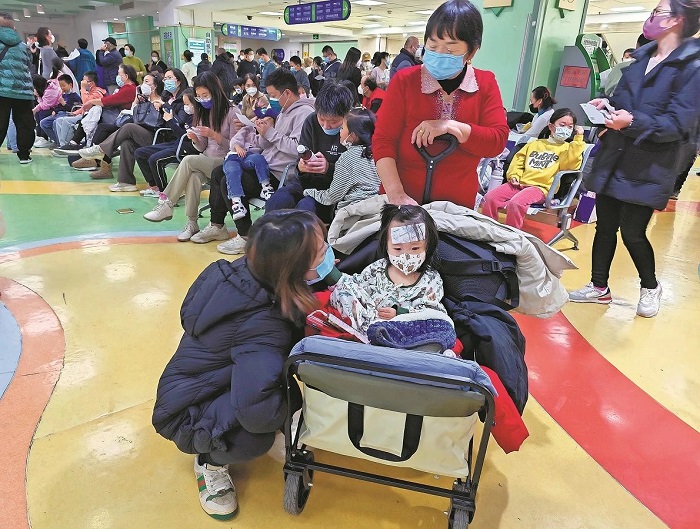China丨Wave of respiratory illness easing
The number of children with respiratory illness visiting hospital pediatric departments is trending downward in China, health officials said on Sunday, adding that a recent nationwide surge in respiratory disease cases had not disrupted normal healthcare services.

▲Sick children await diagnosis and treatment at Capital Medical University's Beijing Children's Hospital in Beijing on Saturday. XING GUANGLI/XINHUA
China has experienced a surge in respiratory disease this winter, driven by co-circulation of multiple pathogens. Young children have been hit hard, stretching the capacities of pediatric facilities in some regions.
Mi Feng, a spokesman for the National Health Commission, told a news conference that the number of visits to large hospitals by child patients with respiratory illness is gradually falling.
"The increase in visits to pediatric hospitals and pediatric departments at general hospitals has also slowed down," he said.
Mi said the overall volume of hospital visits by people with respiratory illness is at a stable level nationwide, thanks to efforts to channel mild cases to grassroots medical facilities, add capacity at pediatric and fever clinics and extend their operation hours.
"Normal medical services across the country are not affected," he said.
Mi said continuous efforts will be made to facilitate partnerships and the transfer of patients between general hospitals and community clinics, and guide patients to seek medical services that fit the severity of their condition.
"Middle and primary schools, nursery care and elderly care homes, social welfare facilities and venues seeing large flows of people should implement ventilation and sanitation work, strengthen health monitoring and urge people to take personal protective measures to reduce the risk of infection," Mi said.
Xia Gang, an official at the National Administration of Disease Prevention and Control, said some local governments had initiated flu vaccination services as early as July, ahead of the peak flu season.
"This year's flu vaccine supplies have grown significantly compared to last year and are sufficient to meet demands," he said, adding that the elderly are particularly susceptible to progressing to severe flu cases and should be prioritized for vaccination.
Peng Zhibin, an official from the Chinese Center for Disease Control and Prevention, said flu vaccination campaigns should also be stepped up among students and staff members on campuses.
"Students, teachers and other staff members should not continue going to class after falling sick, so as to prevent them from infecting others," she added.
Peng also suggested that members of the public should wear masks when taking public transport.
A guideline on wearing masks released by the administration on Saturday said infected people and visitors and staff members at hospitals, nursery care and elderly care facilities should wear them.
Reporter: Wang Xiaoyu
